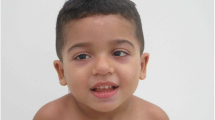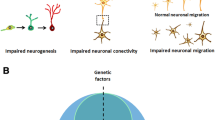Abstract
Prader-Willi syndrome (PWS) is caused by either the structural loss of material or the absence of gene expression from the paternally inherited copy of chromosome 15 in the q11-q13 region. In addition to a well-described behavioral phenotype that includes hyperphagia, obsessive-compulsive symptoms, disruptive behavior, and an increased risk for mood disorders, recent evidence also suggests that some individuals with PWS have repetitive behavior and social deficits reminiscent of autism spectrum disorders. In particular, it appears as if those with maternal uniparental disomy (UPD) as the cause of PWS are at greater risk for autistic symptomatology than those with paternal deletions of 15q11-q13. These findings are particularly intriguing in light of data implicating maternal duplications and triplications of the same chromosomal interval in idiopathic autism, as well as evidence that functional alterations of genes in this region are associated with social deficits found in a variety of neurodevelopmental disorders. This paper will review the recent evidence for phenotypic similarities between autism and PWS and the risk of symptomatology for the UPD subtype.
Similar content being viewed by others
References and Recommended Reading
Bartlett CW, Gharani N, Millonig JH, et al.: Three autism candidate genes: a synthesis of human genetic analysis with other disciplines. Int J Dev Neurosci 2005, 23: 221–234.
Campbell DB, Sutcliffe JS, Ebert PJ, et al.: A genetic variant that disrupts MET transcription is associated with autism. Proc Natl Acad Sci U S A 2006, 103: 16834–16839.
Gupta AR, State MW: Recent advances in the genetics of autism. Biol Psychiatry 2006 [Epub ahead of print].
Cook EH, Jr, Lindgren V, Leventhal BL, et al.: Autism or atypical autism in maternally but not paternally derived proximal 15q duplication. Am J Hum Genet 1997, 60: 928–934.
Bolton PF, Dennis NR, Browne CE, et al.: The phenotypic manifestations of interstitial duplications of proximal 15q with special reference to the autistic spectrum disorders. Am J Med Genet 2001, 105: 675–685.
Vorstman JA, Staal WG, van Daalen E, et al.: Identification of novel autism candidate regions through analysis of reported cytogenetic abnormalities associated with autism. Mol Psychiatry 2006, 11: 1, 18–28.
Peters SU, Beaudet AL, Madduri N, Bacino CA: Autism in Angelman syndrome: implications for autism research. Clin Genet 2004, 66: 530–536.
Samaco RC, Hogart A, LaSalle JM: Epigenetic overlap in autism-spectrum neurodevelopmental disorders: MECP2 deficiency causes reduced expression of UBE3A and GABRB3. Hum Mol Genet 2005, 14: 483–492.
Samaco RC, Nagarajan RP, Braunschweig D, et al.: Multiple pathways regulate MeCP2 expression in normal brain development and exhibit defects in autism-spectrum disorders. Hum Mol Genet 2004, 13: 629–639.
Clarke DJ, Boer H, Chung MC, et al.: Maladaptive behaviour in Prader-Willi syndrome in adult life. J Intellect Disabil Res 1996, 40: 159–165.
Reddy LA, Pfeiffer SI: Behavioral and emotional symptoms of children and adolescents with Prader-Willi syndrome. J Autism Dev Disord 2006 [Epub ahead of print].
Stein DJ, Keating J, Zar HJ, et al.: A survey of the phenomenology and pharmacotherapy of compulsive and impulsive-aggressive symptoms in Prader-Willi syndrome. J Neuropsychiatry Clin Neurosci 1994, 6: 23–29.
van Lieshout CF, de Meyer RE, Curfs LM, et al.: Problem behaviors and personality of children and adolescents with Prader-Willi syndrome. J Pediatr Psychol 1998, 23: 111–120.
Dykens EM, Leckman JF, Cassidy SB: Obsessions and compulsions in Prader-Willi syndrome. J Child Psychol Psychiatry 1996, 37: 995–1002.
Dimitropoulos A, Blackford J, Walden T, et al.: Compulsive behavior in Prader-Willi syndrome: examining severity in early childhood. Res Dev Disabil 2006, 27: 190–202.
Christian SL, Robinson WP, Huang B, et al.: Molecular characterization of two proximal deletion breakpoint regions in both Prader-Willi and Angelman syndrome patients. Am J Hum Genet 1995, 57: 40–48.
Butler MG, Bittel DC, Kibiryeva N, et al.: Behavioral differences among subjects with Prader-Willi syndrome and type I or type II deletion and maternal disomy. Pediatrics 2004, 113: 565–573.
Cassidy SB: Prader-Willi syndrome. J Med Genet 1997, 34: 917–923.
Roof E, Stone W, MacLean W, et al.: Intellectual characteristics of Prader-Willi syndrome: comparison of genetic subtypes. J Intellect Disabil Res 2000, 44: 25–30.
Dykens EM, Cassidy SB, King BH: Maladaptive behavior differences in Prader-Willi syndrome due to paternal deletion versus maternal uniparental disomy. Am J Ment Retard 1999, 104: 67–77.
Symons FJ, Butler MG, Sanders MD, et al.: Self-injurious behavior and Prader-Willi syndrome: behavioral forms and body locations. Am J Ment Retard 1999, 104: 260–269.
Verhoeven WM, Tuinier S: Prader-Willi syndrome: atypical psychoses and motor dysfunctions. Int Rev Neurobiol 2006, 72: 119–130.
Greaves N, Prince E, Evans DW, et al.: Repetitive and ritualistic behaviour in children with Prader-Willi syndrome and children with autism. J Intellect Disabil Res 2006, 50: 92–100.
Milner KM, Craig EE, Thompson RJ, et al.: Prader-Willi syndrome: intellectual abilities and behavioural features by genetic subtype. J Child Psychol Psychiatry 2005, 46: 1089–1096.
Descheemaeker MJ, Govers V, Vermeulen P, Fryns JP: Pervasive developmental disorders in Prader-Willi syndrome: the Leuven experience in 59 subjects and controls. Am J Med Genet A 2006, 140: 1136–1142.
Hartley SL, Maclean WE, Jr, Butler MG, et al.: Maladaptive behaviors and risk factors among the genetic subtypes of Prader-Willi syndrome. Am J Med Genet A 2005, 136: 140–145.
Dimitropoulos A, Feurer ID, Butler MG, et al.: Emergence of compulsive behavior and tantrums in children with Prader-Willi syndrome. Am J Ment Retard 2001, 106: 39–51.
State MW, Dykens EM, Rosner B, et al.: Obsessive-compulsive symptoms in Prader-Willi and “Prader-Willi-Like” patients. J Am Acad Child Adolesc Psychiatry 1999, 38: 329–334.
Feurer ID, Dimitropoulos A, Stone WL, et al.: The latent variable structure of the Compulsive Behaviour Checklist in people with Prader-Willi syndrome. J Intellect Disabil Res 1998, 42: 472–480.
Goodman WK, Price LH, Rasmussen SA, et al.: The Yale-Brown Obsessive Compulsive Scale. I. Development, use, and reliability. Arch Gen Psychiatry 1989, 46: 1006–1011.
Vitiello B, Spreat S, Behar D: Obsessive-compulsive disorder in mentally retarded patients. J Nerv Ment Dis 1989, 177: 232–236.
McDougle CJ, Scahill L, McCracken JT, et al.: Research Units on Pediatric Psychopharmacology (RUPP) Autism Network. Background and rationale for an initial controlled study of risperidone. Child Adolesc Psychiatr Clin N Am 2000, 9: 201–224.
Scahill L, McDougle CJ, Williams SK, et al.: Children’s Yale-Brown Obsessive Compulsive Scale modified for pervasive developmental disorders. J Am Acad Child Adolesc Psychiatry 2006, 45: 1114–1123.
Scahill L, Kano Y, King RA, et al.: Influence of age and tic disorders on obsessive-compulsive disorder in a pediatric sample. J Child Adolesc Psychopharmacol 2003, 13(Suppl 1): S7–S17.
Dimitropoulos A, Klaiman C, Bregman J, et al.: Behavior and emotional problems in Prader-Willi syndrome: comparisons to autism and Williams syndrome. Paper presented at the Annual Prader-Willi Syndrome Association Scientific Conference, 2003. Orlando, FL; July 2, 2003.
Einfeld SL, Tonge BJ: The Developmental Behavior Checklist: the development and validation of an instrument to assess behavioral and emotional disturbance in children and adolescents with mental retardation. J Autism Dev Disord 1995, 25: 81–104.
Veltman MW, Thompson RJ, Roberts SE, et al.: Prader-Willi syndrome—a study comparing deletion and uniparental disomy cases with reference to autism spectrum disorders. Eur Child Adolesc Psychiatry 2004, 13: 42–50.
Berument SK, Rutter M, Lord C, et al.: Autism screening questionnaire: diagnostic validity. Br J Psychiatry 1999, 175: 444–451.
Veltman MW, Craig EE, Bolton PF: Autism spectrum disorders in Prader-Willi and Angelman syndromes: a systematic review. Psychiatr Genet 2005, 15: 243–254.
Cassidy SB: Prader-Willi syndrome. Curr Probl Pediatr 1984, 14: 1–55.
Dykens EM, Cassidy SB: Correlates of maladaptive behavior in children and adults with Prader-Willi syndrome. Am J Med Genet 1995, 60: 546–549.
Heider F, Simmel M: An experimental study of apparent behavior. Am J Psychol 1944, 57: 243–259.
Koenig K, Klin A, Schultz R: Deficits in social attribution ability in Prader-Willi syndrome. J Autism Dev Disord 2004, 34: 573–582.
Veltman MW, Thompson RJ, Craig EE, et al.: A paternally inherited duplication in the Prader-Willi/Angelman syndrome critical region: a case and family study. J Autism Dev Disord 2005, 35: 117–127.
Borgatti R, Piccinelli P, Passoni D, et al.: Pervasive developmental disorders and GABAergic system in patients with inverted duplicated chromosome 15. J Child Neurol 2001, 16: 911–914.
Author information
Authors and Affiliations
Corresponding author
Rights and permissions
About this article
Cite this article
Dimitropoulos, A., Schultz, R.T. Autistic-like symptomatology in Prader-Willi syndrome: A review of recent findings. Curr Psychiatry Rep 9, 159–164 (2007). https://doi.org/10.1007/s11920-007-0086-7
Published:
Issue Date:
DOI: https://doi.org/10.1007/s11920-007-0086-7




